Geology
Geology is the scientific study of the Earth, its materials, processes, and history. It is a broad field that encompasses the study of rocks, minerals, landforms, and the processes that shape the Earth's surface.
Branches of Geology
Geology can be divided into several sub-disciplines:
- Physical Geology: Focuses on the study of Earth materials, such as minerals and rocks, and the processes that shape the Earth's surface, such as erosion and plate tectonics.
- Historical Geology: Examines the Earth's history and the processes that have shaped it over time, including the formation of mountains, continents, and oceans.
- Environmental Geology: Deals with the interactions between humans and the Earth, including the impact of human activities on the environment and natural hazards such as earthquakes and landslides.
- Geochemistry: Focuses on the chemical composition and processes of the Earth and its materials.
- Geophysics: Involves the study of the Earth using physical principles, such as gravity, magnetism, and seismic waves.
Key Concepts to Study
When studying geology, it's important to have a good understanding of the following key concepts:
- Rock Types: Igneous, sedimentary, and metamorphic rocks, and the processes that form and transform them.
- Plate Tectonics: The theory that the Earth's outer shell is divided into several plates that move and interact with each other, leading to the formation of mountains, earthquakes, and volcanoes.
- Mineral Identification: Understanding the physical and chemical properties used to identify and classify minerals.
- Geological Time Scale: The division of Earth's history into eons, eras, periods, and epochs based on significant geological and biological events.
- Earth Processes: Including erosion, weathering, deposition, and the formation of landforms such as mountains, valleys, and coastlines.
- Natural Hazards: Understanding the causes and impacts of natural disasters such as earthquakes, tsunamis, and volcanic eruptions.
Study Tips
Here are some tips for studying geology effectively:
- Make use of diagrams, maps, and models to visualize geological processes and concepts.
- Practice identifying rocks and minerals using physical and chemical properties.
- Use flashcards to memorize key terms and concepts, such as the names of geological periods and major geological events.
- Take field trips to observe geological features in nature and gain a better understanding of how they form.
- Stay updated with current geological events and discoveries by reading scientific journals and news articles.
By mastering the key concepts and studying effectively, you can develop a solid understanding of geology and its significance in understanding the Earth's past, present, and future.
.◂Biology Worksheets and Study Guides High School. Microorganisms I
Worksheet/Answer key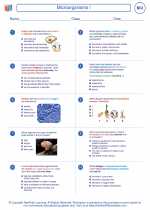 Microorganisms I
Microorganisms I  Worksheet/Answer key
Worksheet/Answer key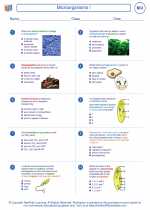 Microorganisms I
Microorganisms I  Worksheet/Answer key
Worksheet/Answer key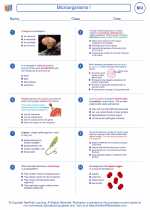 Microorganisms I
Microorganisms I  Worksheet/Answer key
Worksheet/Answer key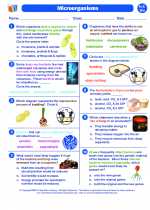 Microorganisms I
Microorganisms I  Vocabulary/Answer key
Vocabulary/Answer key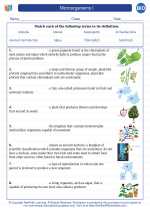 Microorganisms I
Microorganisms I  Vocabulary/Answer key
Vocabulary/Answer key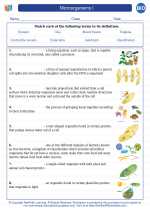 Microorganisms I
Microorganisms I  Vocabulary/Answer key
Vocabulary/Answer key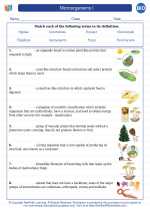 Microorganisms I
Microorganisms I  Vocabulary/Answer key
Vocabulary/Answer key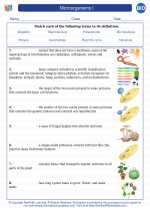 Microorganisms I
Microorganisms I  Vocabulary/Answer key
Vocabulary/Answer key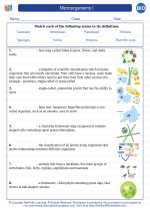 Microorganisms I
Microorganisms I 

 Worksheet/Answer key
Worksheet/Answer key
 Worksheet/Answer key
Worksheet/Answer key
 Worksheet/Answer key
Worksheet/Answer key
 Vocabulary/Answer key
Vocabulary/Answer key
 Vocabulary/Answer key
Vocabulary/Answer key
 Vocabulary/Answer key
Vocabulary/Answer key
 Vocabulary/Answer key
Vocabulary/Answer key
 Vocabulary/Answer key
Vocabulary/Answer key

The resources above cover the following skills:
BIOLOGY
Unity and Diversity
Obtain, evaluate, and communicate information to explain how organisms are classified by physical characteristics, organized into levels of taxonomy, and identified by binomial nomenclature (e.g., taxonomic classification, dichotomous keys).
Engage in argument to justify the grouping of viruses in a category separate from living things.